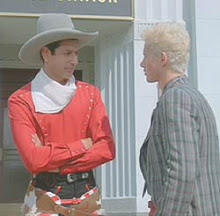
632. DAVID BOWIE, "Suffragette City"
Produced and written by David Bowie
RCA Victor 0719 1972 Did not make pop charts
I'm young enough that I don't really remember much of the public events of the early 1970s directly, at least not before Watergate.
 I experienced most of that period by refraction, but one of the things that makes perfect sense to me is that everyone who was into rock in the early 1970s seems to have loved David Bowie. How could you not? According to John Lydon's autobiography, Bowie was practically the only musician that British youths wouldn't fight over during that period: proto-punks, pub rockers, art school posers, they all found something to adore in him. Bowie rocked hard and glammed up. He was simultaneously macho and fey. More than anything, he was many heterosexual women's dream: sensitive like a gay man but still sexually available.
I experienced most of that period by refraction, but one of the things that makes perfect sense to me is that everyone who was into rock in the early 1970s seems to have loved David Bowie. How could you not? According to John Lydon's autobiography, Bowie was practically the only musician that British youths wouldn't fight over during that period: proto-punks, pub rockers, art school posers, they all found something to adore in him. Bowie rocked hard and glammed up. He was simultaneously macho and fey. More than anything, he was many heterosexual women's dream: sensitive like a gay man but still sexually available.Obviously, one of the great things about glam is that it made explicit in popular culture a spectrum of masculinity, just as feminism was emphasizing in the public culture of that same period that there was and should be a spectrum of femininity or womanhood. Some of this had to do with gay and lesbian liberation during this period, but it also augured a second, connected revolution, because it was about gender as well as sexual orientation. Gender didn't have to be a trap, even if you were straight. There wasn't just one way to be straight. You could choose what kind of a man or a woman you wanted to be.
In my hometown during the Bowie era, a lot of this particular culture war seemed to have boiled down to hair. I remember the older generation being very disturbed over the fact that there were all these "unisex" barber shops opening up. Of course, the word "unisex" seemed to scare them in and of itself, but beyond that I believe many men of my dad's generation saw the barber shop as a male place. Why would you want to let women into it? Would you really want a woman to cut your hair? How could you talk to her the way you talk to a guy while he's cutting it? Women couldn't cut a man's hair anymore than they could serve him a drink at his favorite bar. Those were places where a man went to be with other men, and you shouldn't say in mixed company what a man thought of any woman who could be found in places like that.
In retrospect, I find it appropriate that the first unisex barber shop that I remember opening in my hometown was called "Broadway Joe's."
 It wasn't on Broadway (we didn't have a Broadway), but it was almost certainly named after "Broadway" Joe Namath, the proud and preening quarterback who led the New York Jets to one of the most surprising Super Bowl victories ever. Namath was a ladies' man and he was a fop. He did an infamous TV commercial wearing pantyhose, and still no one questioned either his masculinity or his heterosexuality.
It wasn't on Broadway (we didn't have a Broadway), but it was almost certainly named after "Broadway" Joe Namath, the proud and preening quarterback who led the New York Jets to one of the most surprising Super Bowl victories ever. Namath was a ladies' man and he was a fop. He did an infamous TV commercial wearing pantyhose, and still no one questioned either his masculinity or his heterosexuality.It would be pushing it to say that Joe Namath was America's Bowie, but he did herald a similar transformation for our culture, which would lead by the end of the decade to jewelry, hair gel, and blowdryers for men, not to mention comfort at a surprisingly localized level with women in what had formerly been wholly male enclaves. For a while, my wife and I got our hair cut by the same woman, and all the bartenders at my favorite pub are female, and it seems unspeakably odd to me that there ever could have been a question about any of this.
Plus, as this particular Bowie B-side suggests, for many straight men, there can be a bit of a charge to women not only being equal to but sometimes stronger than they are. Don't listen to Phyllis Schafly and her generational descendants: feminism doesn't kill male heterosexuality. It enhances it.

No comments:
Post a Comment